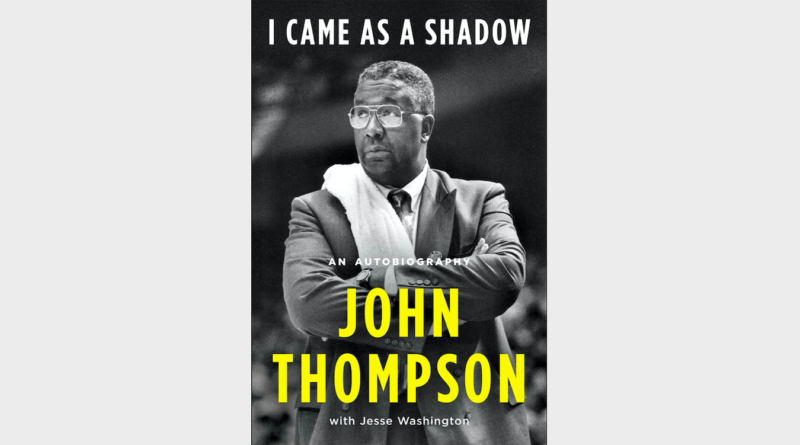REVIEW: ‘I Came as a Shadow’ by John Thompson
Image courtesy of Henry Holt and Co. / Provided by official site.
John Thompson’s posthumously published autobiography, I Came as a Shadow, is a thoughtful, powerful look at the basketball coach’s impactful life and career. There’s a lot of basketball within these 300+ pages, including his time on the Boston Celtics and his legendary run as head coach at Georgetown, and there are many important stories and insights about race, his upbringing, his coaching philosophy, the discrimination he faced, and his overall view on sports, the NCAA, and some of his most famous players, including Patrick Ewing, Allen Iverson and others. As the book’s dust jacket states, Thompson was an iconic NCAA champion, Black activist and educator.
Thompson grew up in Washington, D.C., during the era of Jim Crow segregation. He shares several stories about his mother and father, and the sacrifices they made to ensure his upbringing was based in education and love. Those early lessons about the value of education stuck with Thompson throughout his entire life, and he brought that emphasis to his illustrious coaching career. In wonderful detail, the coach and co-writer Jesse Washington explain how he led the Georgetown men’s basketball team to success, and much of it had to do with his respect for the academic side of the student-athlete experience. He repeatedly told his players that one day basketball would end for them — for some, that end came after Georgetown, while others went pro — but the educational lessons they took from this institution of higher education would stay with them forever, leading to fulfilled lives and successful careers. These are inspirational words that the coach lived by.
The first 100 pages or so detail Thompson’s young life and how he found and excelled at the game of basketball. He eventually played at Providence College and then went on to a professional career at the Boston Celtics. Along the way, he learned valuable information from many influential figures, including his Celtics coach Red Auerbach. He also taught many lessons to the very same people he was influenced by.
The heart of the book is Thompson’s Georgetown career. He opens up about race and racism at this time of his multi-year run, including the double standard that he and his team members had to face. There are many insightful entires within these pages about his leadership as a Black basketball coach, his trailblazing when it came to recruitment and development of players, and his protests when he believed the system was wrong. Most notably, there’s an entire chapter set aside for the time when he walked off the court to oppose the NCAA’s Proposition 42 and its exclusionary practice. He also questions the media coverage of his coaching and players, and why his athletes were characterized as “intimidating” while white players were simply seen as “tough.”
There are the stories of how Thompson won the NCAA championship and how he worked with players who went on to become NBA superstars. A common theme is the inner-debate some of his most well-known players had when it came to the question of whether to leave college early and go pro, or stay for a four-year education. He has loving and respectful words for many of his players, especially Ewing, who is currently the Georgetown basketball coach. When he discusses these athletes, it’s obvious that Thompson cared a great deal about them, far beyond simply scoring baskets on the court.
There are chapters about Nike, where Thompson sat on the board, plus an engaging story about a “D.C. drug kingpin.” There are also personal insights about the coach’s faith (he was devoted to the Virgin Mary) and his family (a beautifully written and revealing passage ends the autobiography and frames his Georgetown career in a historic perspective). Within this book, which draws its title from a poem written by Thompson’s uncle, the coach explores not only his life and career in the game of basketball, but what his leadership meant to the Black community, his players, his fellow coaches, the league, the university and, ultimately, himself.
Thompson, who died in 2020, will be missed, but his legacy and influence live on.
By John Soltes / Publisher / John@HollywoodSoapbox.com
I Came as a Shadow: An Autobiography by John Thompson with Jesse Washington. 352 pages. Henry Holt and Co. Click here for more information.

